- Home
- Rabindranath Tagore
He (Shey) Page 4
He (Shey) Read online
Page 4
‘The scientists on the island have extracted a green essence from the grass and dried it in the sun’s ultraviolet rays. They’ve rammed fistfuls of this up their nostrils, just as if it were snuff. In the morning, they stuff their right nostrils; at noon, their left. In the evening, they pack both nostrils full, and that’s the main meal of the day. Their combined sneezes have driven disgusted hordes of birds and animals across the sea to the mainland.’
‘That sounds good. I’ve been jobless a long time, Dada, my digestive organs are running amok. If I could start a trade in this snuff at New Market—’
‘There’s a bit of a problem there, which I’ll explain to you later. But these scientists have yet another theory to expound. Because man stands erect and walks on his two legs, his heart and stomach hang to their deaths. His innards have been subjected to this unnatural torture for tens of thousands of years. He pays for this by losing years of his life. Men and women die of their suspended hearts. Quadrupeds, however, need never bother their heads about such dangers.’
‘I understand, but what’s to be done?’
‘The scientists propose that men must learn of Nature’s plan for them from babies. On the highest hill on this island, a professor has inscribed these words on stone: “All men must crawl and re-enter existence as quadrupeds, if they wish to prolong their acquaintance with the earth”.’
‘Splendid! But isn’t there something more to this?’
‘There is. They remind us that speech is man’s invention, not Nature’s gift. Our incessant babbling daily shortens our breath, and our lives in the long run. Apes, with their natural intelligence, were the first to discover this. Monkeys, created right in the second stage of evolution, survive to this day. Alone on that desolate island, the scientists have pledged absolute deference to this ancient wisdom. They sit in complete silence, gazing at the ground. On that entire island, not a sound issues from human lips; all one can hear are gigantic sneezes.’
'How do they communicate?'
'They've developed an extraordinary code of signals. Sometimes they pretend to be husking rice; sometimes they wave imaginary fans; occasionally they're seized by wild fits of swaying and shaking, like a betel nut tree in the wind. They even write poetry by scowls and winks. Audiences are often moved to tears, and where the air is thick with snuff, it gets rather stuffy.'
'I beg of you, Dada, lend me some money. I must go to Hoonhau. What a new lark it'll be-'
'Hold your horses. The new hasn't had the chance to grow old yet. The settlement's splitting with the scientists' sneezes. Barrels of green snuff are lying about everywhere. Not a single nose in the place that's fit for human use.'
'You're making all this up. Even science can't let its jokes go that far. You thought you'd astound Pupu-didi with your made-up history of this island. You'd planned to dispose of your luckless He by sending him sneezing round the island in theguise of a scientist. You’d describe how, by ceremonious head-wagging, I enraptured audiences with renditions of those prodigious lyric poems composed to celebrate the slaying of Ghatotkacha.13 Maybe you’d even marry me off to some crawling, shoulder-waggling island beauty. As the mantras were recited, she’d waggle her head from left to right, and I’d waggle mine from right to left. You’d double the seven steps taken by the wedded couple to fourteen, like the lines of a sonnet. When the islanders filed into the Senate Hall14 to sit for their exams in the Shoulder-Waggling language, you’d dump me in the corner. You’ve never shown me any mercy; you’d be sure to have me fail. But in their Sporting Club’s crawling race, you’d award me first prize. I’m warning you, if you imagine you can make Pupu-didi laugh with these stories, you’d better think again!’
‘Don’t jabber so. To make a particular class of people live longer, the sage Chanakya15 advised, “The fool shall live so long as he does not say too much.” I believe you’ve learnt some Sanskrit?’
‘I’ve forgotten one and a half times what I learnt. A modern Chanakya wrote for the benefit of the whole world, “All heave a sigh of relief when the wise man shuts up.” You’d do well to remember it; it matches the earlier rhythm. Now I’m off. My advice is, leave off your scientific humour and try to be as childish as you can.’
This story didn’t appeal to Pupu-didi at all. Wrinkling her brow, she objected, ‘Is it possible? How could you ever fill your stomach with snuff?’
‘But they started by dismissing the entire idea of the stomach,’ I reminded her.
Pupu-didi seemed reassured. ‘Oh, did they really?’
But the idea of not talking troubled her to the end. ‘Can one survive without talking?’
I said, ‘The wisest pandit on the island has sent round notices written on leaves, to warn people of the danger of talking. He proved by census that all those who talked, died.’
But a new question had occurred to Pupu-didi.
‘What about dumb people?’
‘The dumb didn’t die of talking, they died of tummy upsets or colds.’
Pupu-didi thought this reasonable.
‘What do you think of all this, Dadamashai?’16
I answered, ‘Some die talking, and some without talking.’
‘How would you like to die?’
‘I think I’ll go and live on Hoonhau Island for a while. On the Isle of Jambu, they nearly talked me to death, I can’t stand it any more.’
* * *
13Ghatotkacha: a character in the Mahabharata, the son of Bhima and his ogress-wife Hirimba. Ghatotkacha was slain by Karna on the fourteenth day of the battle of Kurukshetra.
14Senate Hall: a stately building (now pulled down) on the Calcutta University campus, used to hold examinations among other functions.
15Chanakya: a famous political theorist of ancient times; adviser to Chandragupta Maurya.
16Dadamashai: grandfather.
3
HE HAS SENT ME A REPORT OF THE ACTIVITIES OF THE SOCIETY FOR THE Improvement of Jackal Behaviour. I intend to read it aloud in Pupu-didi’s company this evening.
REPORT
I was sitting in a field one evening, enjoying the fresh breeze, when a jackal suddenly approached me. He said, ‘Dada, you’re busy making men of your own offspring. What have I done to be left out?’
I asked, ‘What can I do about that?’
‘I might be an animal, but can’t I aspire to the joys of life? I’m determined you shall make a man of me.’
I thought it would be a worthy deed to rear this poor creature.
I asked, ‘What made you decide this?’
He answered wistfully, ‘If only I could grow up to be a man, I’d earn quite a name in jackal society. The other jackals would worship me as a god.’
‘Very well,’ I agreed.
Returning home, I gave my friends the news. They were delighted. ‘This will be good work indeed,’ they approved. ‘The world will benefit from it.’
A few of us got together to form a committee, and we decided to name it ‘The Society for the Improvement of Jackal Behaviour’.
There is an old holy porch in our village, fallen to ruin from long years of disuse. We decided to meet there after nine each evening, to engage upon the worthy task of making a man of the jackal.
I asked him, 'Young man, what do your brothers call you?'
The jackal answered, 'How-How.'
'Disgraceful,' I said. 'This will never do. We must first change your name, then your appearance. From this day on, your name is Shiburam.'
‘All right,’ he agreed. But the expression on his face told me that the name Shiburam was not as sweet to his ears as How-How. Well, there was no help for it. He just had to be human.
Our first job was to make him stand on two legs. It took a long time. He tottered about with great difficulty, falling down every so often. It took six months to get him to stay erect. To hide his paws, we made him wear shoes, socks and gloves.
At last our president, Gour Gosai, said to him one day, ‘Shiburam, have a look at your two-legged re
flection in the mirror. See if you like it.’
Shiburam surveyed himself in the mirror for a good while. He twirled and pirouetted and craned his neck, trying to view himself from every possible angle. Finally, he complained, ‘But Gosai-ji, I still don’t look like you, do I?’
Gosai-ji pointed out, ‘Shibu, just standing straight won’t suffice. It isn’t easy to be human. What about your tail? Can you bring yourself to sacrifice it?’
Shibu’s face went pale. The fame of his tail had spread to a dozen neighbouring jackal-villages. Ordinary jackals called him Fine-Tail. Those who knew jackal-Sanskrit had named him The Furry-Tailed One. He spent two days and three nights in an agony of indecision. Finally, on Thursday, he announced, ‘I agree.’
His splendid auburn brush of a tail was cropped close to his rump.
The committee members exclaimed in reverent tones, ‘Behold a beast delivered from bestial bondage! At last he is rid of his deluded affection for his tail! He is blessed!’
Shibu heaved a deep sigh and, suppressing his tears, echoed in a small voice, ‘Blessed!’
He had no appetite that day. All night, he dreamed restlessly of his lost tail.
The next day, when Shibu appeared at our nightly meeting, Gosai-ji asked, ‘Now then Shibu, doesn’t your body feel light without that tail?’
Shibu said unhappily, ‘Very light indeed. But something tells me that even without my tail, our complexions make us different.’
Gosai-ji answered, ‘If you wish to remove that difference between your race and ours, you’ll have to sacrifice your fur as well.’
Tinu, the barber, arrived.
It took him five days to coax the fur off Shibu’s body with the razor. But Shibu’s new-found good looks confounded every one of us.
Shibu asked worriedly, ‘Why don’t you say anything?’
The committee answered, ‘We are speechless at our own brilliance.’
Shibu felt somewhat at peace. He forgot about his cut-off tail and shaved-off fur.
The members closed their eyes and said firmly, ‘Shibu, this is the end. Our society is here dissolved.’
Shibu declared, ‘Now all that’s left is to astonish the jackal community.’
Meanwhile, Shiburam’s aunt, Khenkini or Miss Yapper, had been pining for her nephew. She went to Hookkui, the village chief, and said, ‘Chief, why haven’t I seen my How-How for more than a year? Do you think he’s fallen prey to bears and tigers?’
The chief replied, ‘Who’s afraid of bears and tigers? It’s men we have to be afraid of. Perhaps How-How’s fallen into their snares.’
A search began. At last, the group of volunteers wandered into the bamboo thicket surrounding the holy porch.They called, ‘Hukka-huaaa…’
Shibu’s heart fluttered; he longed to lend his voice to that single-toned incantation. He suppressed his desire with the greatest difficulty.
After three hours, the call came again. A strangled sob rose from Shibu’s throat. But he held himself in check.
But when after another three hours the jackals called again, Shiburam couldn’t restrain himself. He called back, ‘Hukka-huaa, hukka-huaa, hukka-huaa!’
Hookkui exclaimed, ‘I hear How-How’s voice. Call again!’
The jackals chorused, ‘How-How!’
The president of the society leapt out of bed and scolded, ‘Shiburam!’
Again the call floated in, ‘How-How!’
Gosai-ji warned him again, ‘Shiburam!’
But when, at the third call, Shiburam bounded out, the entire search party turned tail and fled. Even Hookkui, Heiio, Hoo-Hoo and the other jackal braves sought refuge in their burrows. The entire jackal community was stupefied.
Six months passed after that.
The latest bulletin says Shiburam has taken to wandering about all night, crying, ‘Where’s my tail, where’s my tail?’
Sitting on the veranda outside Gosai-ji’s bedroom, he looks imploringly at the heavens and moans with the passing of each hour, ‘Give me back my tail.’
Gosai-ji can’t even pluck up the courage to open the door— what if this crazy jackal were to attack him?
Shibu is now forbidden to visit the grove where he used to live, because the other jackals, seeing him approach, either run away or growl and snap at him. He lives in the old holy porch, in the sole company ofa pair ofowls. Even Khadu, Gobar, Benchi, Dheri and the other young scamps are too scared of ghosts to go looking for karamchas17 in that part of the forest.
Shibu has composed, in jackal language, the following mournful ditty:
O tail, my lost tail; without you, I’m now
Soulless, dead,
A tailless shred—
How-how, how-how, how-how!
Pupe broke out, ‘How awful, what a shame! Dadamashai, won’t even his aunt let him back into the burrow?’
‘Don’t you worry,’ I said. ‘Just let his fur grow back and she’ll be able to recognize him again.’
‘But what about his tail?’
‘Perhaps we can get some tail-growing ointment from the kaviraj.18 I’ll try to find out.’
Drawing me into a corner, He whispered, ‘Dada, don’t lose your temper, but I must speak my mind. Aren’t you in need of a little improvement yourself?’
‘You cheeky rascal, how must I improve myself?’
‘Stop being so old. Here you are, ageing, but you’ve yet to mature in childishness.’
‘What’s your proof?’
‘Look at this report you’ve just read out. You wrote it purely in jest, out of the cockiness of your advanced years. But don’t you notice how sombre Pupu-didi looks? Your story probably sent a chill down her spine. Perhaps she imagined your de-furred jackal coming to complain to her. If you can’t stop being so clever, you’d better give up telling stories.’
‘It’s difficult for me to tone down my cleverness. You wouldn’t understand; you’ve never had to make such an effort. The Creator is on your side.’
‘Dada, now you’re getting angry. But I tell you, the pungency of your intelligence has dried up all the fun in you. You think you’re being funny, but when your humour gets under the skin, it grates like a scrubbing-stone. I’ve warned you often enough—in trying to laugh, or to make others laugh, don’t risk your comfort in the next life. Didn’t you see Pupu-didi’s eyes fill with tears at the plight of the tailless jackal? If you like, I’ll go and make her laugh right this minute—pure laughter, without any alloy of intelligence.’
‘You don’t have a written piece ready, do you?’
‘I do. It begins in the style of a play. All I need say is that Udho, Gobra and Ponchu of our neighbourhood are talking. Pupu-didi has already made their acquaintance.’
‘Very well, let’s see what she makes of it.’
THE TREE-SAGE
Udho. Well, did you find him?
Gobra. Brother, after hearing what you said, I’ve ground my bones to powder this last month, hunting for him in woods and copses, without even a glimpse of his holy hair-tuft.
Ponchu. Who are you looking for?
Gobra. The Tree-Sage.
Ponchu. The Tree-Sage! Who on earth is he?
Udho. Why, haven’t you heard of him? Everyone in the world knows his name.
Ponchu. Well, let’s hear what it’s all about.
Udho. Any tree the Sage seats himself upon is instantly transformed into a wishing-tree. If you stand under it and stretch out your hand, you’ll get anything you ask for.
Ponchu. Where did you get the news?
Udho. Bheku Sardar of Dhokar village told me. The Tree-Sage was perched on a fig tree, swinging his legs. Bheku, who was carrying on his head a large pot of treacle to mix with tobacco, passed under the tree in all innocence. The Tree-Sage’s dangling leg knocked the pot over, and Bheku found his lips and eyelids sealed with treacle. The Baba is kindness itself; he said, ‘Bheku, tell me your heart’s desire, and it shall be granted.’
Bheku’s a fool. He answered, ‘Baba, give me a
towel, so that I can wipe this treacle off my face.’
No sooner had he spoken than a towel dropped from the branches. When he was done mopping his face, he recovered his wits and looked up at the tree. But the Tree-Sage was gone. You can only make one wish. After that, even if you rend the heavens with your wails, he won’t respond.
Ponchu. Dear, dear, not a shawl, not a stole, just a towel? But then, what sense could you expect Bheku to have?
Udho. That’s as it may be. He’s getting along quite nicely with just the towel. He’s built himself a new house, with a fancy eight-sided roof, at the chariot square. Haven’t you seen it?
Ponchu. How can that be? Is it magic?
Udho. The other day, at the Hondalpara fair, Bheku spread out his towel and got ready for business. People flocked to him in thousands. Each time he uttered Baba’s name, there was a positive shower of coins, new potatoes and fresh radishes. The women would come to him and beg, ‘Brother Bheku, touch my son’s head with your blessed towel, he’s been ailing with the fever for three whole months.’ Bheku’s laid down his rule: five quarter-rupees, five whole betel nuts, five measures of rice and five jars of ghee as offerings in return for his services.
Ponchu. They’re making their offerings all right, but are they getting any results?
Udho. I should think so! Gajan Pal filled the towel with grain fifteen days in succession; then he knotted a rope to one corner and tied on a goat; its bleating brought people rushing to the spot. In eleven months’ time, Gajan had a job. He now prepares the palace guard’s siddhi19 and curls the ends of his moustache.
Ponchu. You don’t say! Is this true?
Udho. Of course it’s true! Why, Gajan’s my uncle’s son’s brother-in-law!
Ponchu. Brother Udho, have you seen the towel?
Udho. Certainly! Why, you couldn’t tell it apart from any other of those Hotuganj weaves, a yard and a half wide, the colour of champa flowers, with a red border.

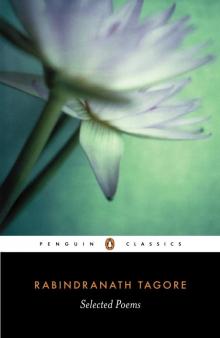 Selected Poems
Selected Poems The Lover of God
The Lover of God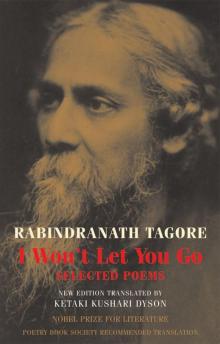 I Won't Let You Go: Selected Poems
I Won't Let You Go: Selected Poems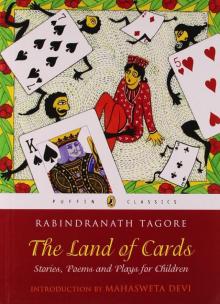 The Land of Cards: Stories, Poems, and Plays for Children
The Land of Cards: Stories, Poems, and Plays for Children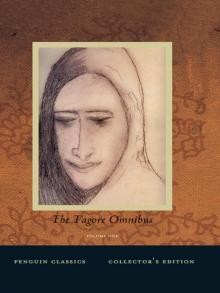 The Tagore Omnibus, Volume One
The Tagore Omnibus, Volume One The Boat-wreck
The Boat-wreck Chokher Bali
Chokher Bali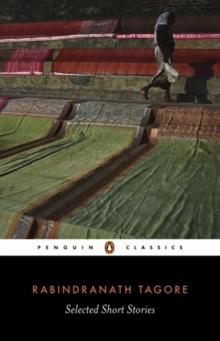 Selected Short Stories
Selected Short Stories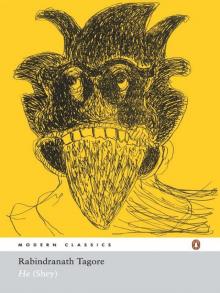 He (Shey)
He (Shey) Letters From a Young Poet 1887 1895
Letters From a Young Poet 1887 1895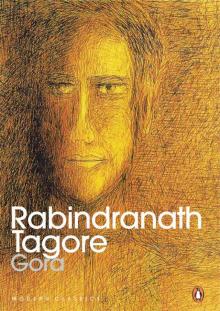 Gora
Gora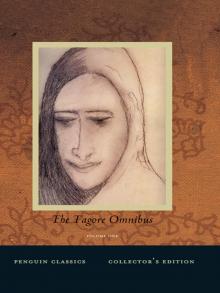 Tagore Omnibus, Volume 1
Tagore Omnibus, Volume 1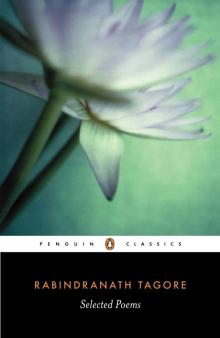 Selected Poems (Tagore, Rabindranath)
Selected Poems (Tagore, Rabindranath)